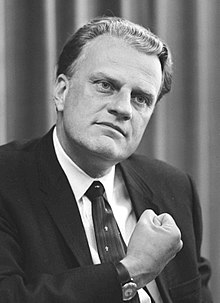In striking contrast with his more limited access with Truman, Eisenhower and Kennedy, Graham would not only visit the White House private quarters but would also at times kneel at Johnson's bedside and then pray with him whenever the President requested him to do so.
Graham once recalled "I have never had many people do that." In addition to his White House visits, Graham would visit Johnson at Camp David and occasionally met with the President when he retreated to his private ranch in Stonewall, Texas.
Johnson would also become the first sitting President to attend one of Graham's crusades, which took place in Houston, Texas, in 1965.
During the 1964 U.S. presidential election, supporters of Republican nominee Barry Goldwater sent an estimated 2 million telegrams to Graham's hometown of Montreat, North Carolina, and sought the preacher's endorsement.
Supportive of Johnson's domestic policies, and hoping to preserve his friendship with the President, Graham resisted pressure to endorse Goldwater and stayed neutral in the election.
He spent the last night of Johnson's presidency in the White House, and he stayed for the first night of Nixon's. After Nixon's victorious 1968 presidential campaign, Graham became an adviser, regularly visiting the White House and leading the president's private worship services. In a meeting they had with Golda Meir, Nixon offered Graham the ambassadorship to Israel, but he refused.
Graham was criticized by some for being too attracted to the seat of political power. Graham officiated at one presidential burial and one presidential funeral. He presided over the graveside services of President Lyndon Johnson in 1973 and took part in eulogizing the former president.








